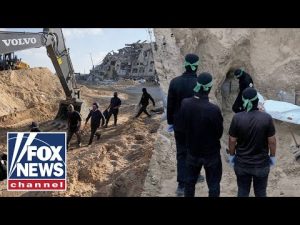As President Trump steps onto the world stage, juggling international relations with the dexterity of a circus performer, his latest global achievement finds itself under intense scrutiny. This drama unfolds as tensions flare anew in the perpetually tumultuous region of Gaza. With renewed fighting between Israel and Hamas, Israel accuses Hamas of blatantly violating a cease-fire. While President Trump finds himself in Japan preparing for a diplomatic tango with Chinese President Xi Jinping at a major economic summit, his attention inevitably drifts back to the Middle East, where a delicate peace balance teeters on the brink.
In this continual saga of cease-fire agreements as fragile as a house of cards, Israel’s Prime Minister responds with a declaration to enforce promises made. The “powerful strikes” he orders are not just theatrics for the cameras; they are his government’s firm response to an attack on Israeli soldiers. An Israeli military source points fingers at Hamas for breaching the “yellow line” into Israel-controlled territories in Gaza, sparking a series of retaliatory airstrikes. As usual, the accusations and denials fly faster than the rockets themselves.
Amid the chaos, finger-pointing, and accusations, the Defense Minister of Israel draws a line in the sand, calling the attack a “red line.” Words from the Defense Ministry echo across the news, asserting that Hamas will pay a hefty price for this latest breach of agreement, a sentiment undoubtedly shared by their Prime Minister. Meanwhile, back in the land of endless debates, conjecture surrounds the return of hostages, an unenviable task that is mired in its complexity. Hamas denies any involvement in today’s events, choosing to withhold further hostage releases amid claims of Israeli violations of the cease-fire.
Despite the fire and brimstone talk filling the airwaves, Vice President J.D. Vance surprisingly remains hopeful. According to his optimistic view, slight skirmishes won’t derail the President’s grand plan for peace, maintaining that it will stand firm. While positive thinking is nice, one must wonder if it’s misplaced among international players who treat agreements like optional pacts rather than binding contracts.
Phase 2 of the cease-fire discussions might continue as planned, but observers can only watch and wait to see if this delicate situation will transform into a lasting peace or deteriorate into more conflict. President Trump, balancing this diplomatic circus act, keeps one eye on Jerusalem and the other on Beijing, a veritable juggling act that never quite seems to settle. Nevertheless, hope is not entirely extinguished, even as the flames of war threaten to rise once again.







